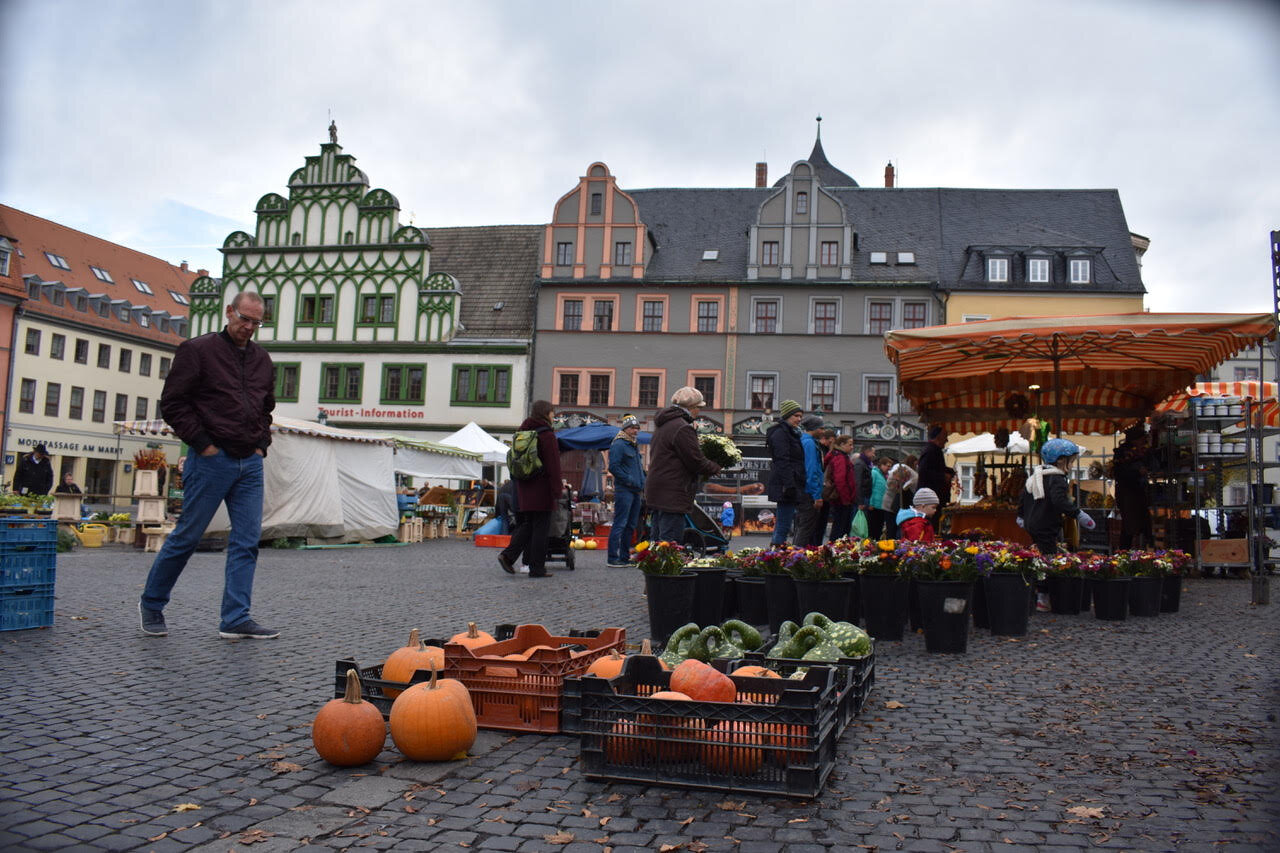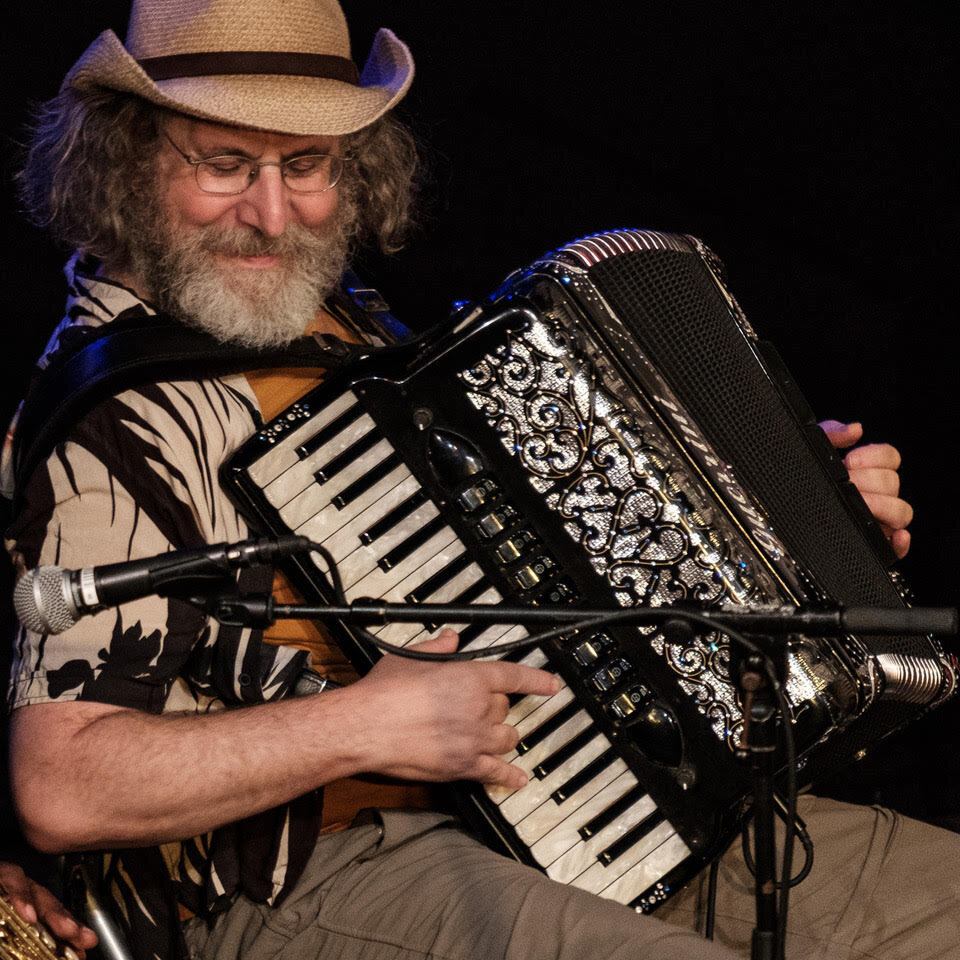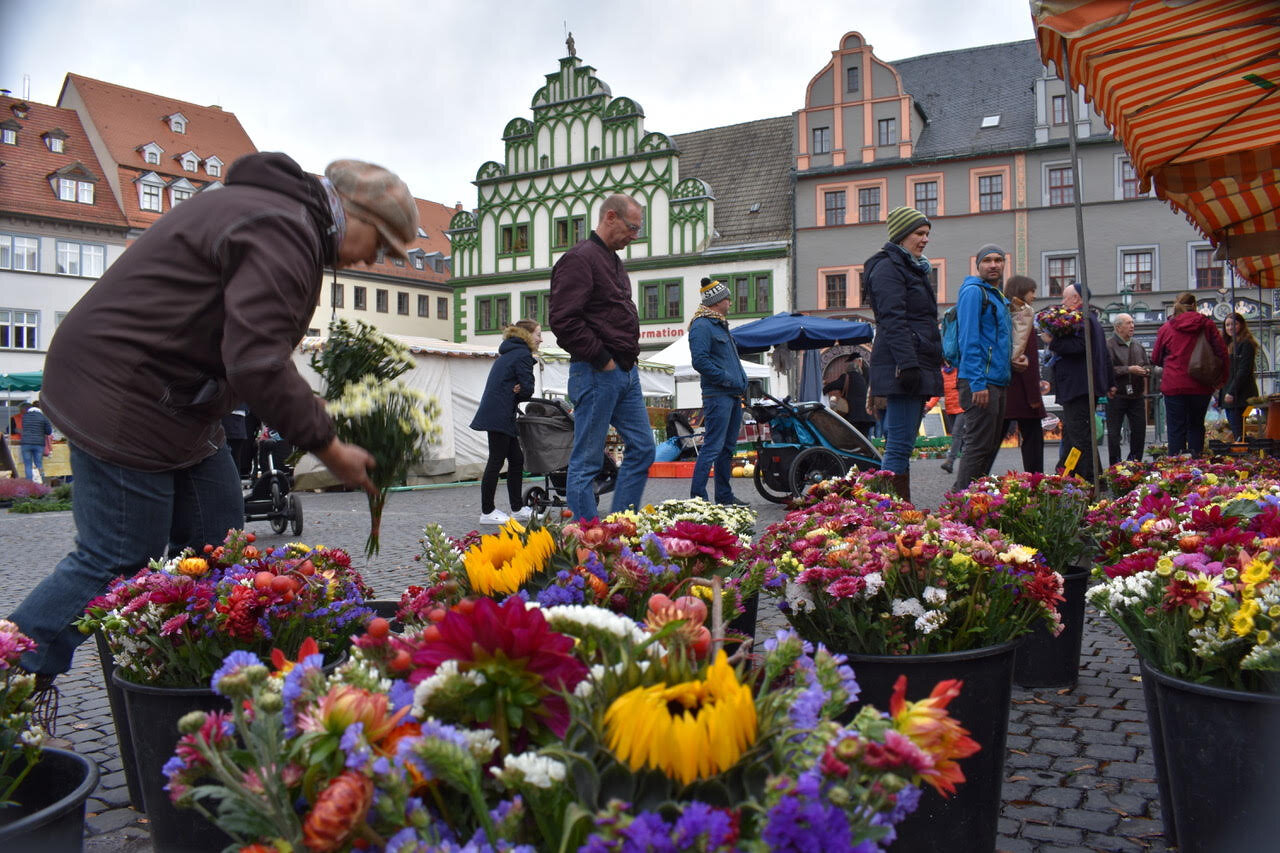Yiddish music is resurging in the Weimar square Hitler frequented
A small Yiddish music workshop in the 1990s became a wild success. So composer Alan Bern founded what is now known as Yiddish Summer Weimar, a five-week summer institute and festival for the study, creation and performance of Yiddish culture and music in the heart of Germany.
BERLIN— In a clear homage to the Beatles’ 1967 “Sgt. Pepper’s Lonely Hearts Club Band” album cover and its wonderful whirl of colorful visuals, the poster for this year’s Yiddish Summer Weimar (YSW) festival features a menagerie of cut-out visages: from Johann Sebastian Bach and Johann Wolfgang von Goethe, to wandering cattle and a bedecked bass drum reading, “Makonovetsky’s Wandering Stars Club Band.”
A poster for the Yiddish Summer Weimar festival starting July 21, 2021.
Together, the collage symbolizes the transcultural and time-spanning story of Yiddish culture and music — its progenitors and critics, its historical influences and contemporary performative interpreters.
At the center of it all stands Alan Bern.
The Bloomington, Indiana-born composer, musician, educator and cultural activist made his way to Berlin, Germany in 1987. There, he helped found Brave Old World, a band described by The Washington Post as the first “supergroup” of klezmer music’s contemporary revival movement.
Klezmer music is an instrumental tradition of Ashkenazi Jews of Europe. Simply meaning “musician,” the word “klezmer” reflects, and conveys, its broader Yiddish roots.
A spoken language of a considerable portion of Ashkenazi Jews for centuries, Yiddish emerged in 9th-century Europe as a mix of German vernacular, written Hebrew, and Aramaic, Slavic, and Romantic linguistic influences and vocabulary. Meaning “Jewish” in the language itself, Yiddish is also the vehicle for a rich culture heritage of everyday Jewish life and celebration: proverbs, humor, idioms and music.
Over the last 30-odd years, klezmer – and Yiddish language and culture in general – has been enjoying quite the comeback.
In the midst of this rejuvenation, Bern and Brave Old World were invited to conduct a workshop on Yiddish music in the central German city of Weimar as part of the European Summer Academy in 1999. The workshop was a wild success and Bern became the founding artistic director of what is now known as YSW — a five-week summer institute and festival for the study, creation and performance of Yiddish culture and music in the heart of Germany.
Today, it is one of the most widely recognized programs for the renewal of Yiddish culture in the world, receiving awards from the European Union and the German Music Council, among others. In 2016 Bern was awarded the Weimar Prize in recognition of his significant cultural contributions to the city.
For Bern, YSW is about more than showcasing Yiddish music; it’s about exploring Yiddish culture as a complex, and continually evolving, convergence of European and non-European customs. It’s also about empowering people for creativity and connection on a continent evermore marked by diversity and difference.
READ: In Europe's 'Secular Capital,’ Some Berliners Are Finding Solace In Religion
“A long odyssey into different kinds of music”
The Beatles cover tribute is more than just a clever promo, it’s also a throwback to when Bern’s musical journey began.
As a child in the 50s, Bern started off as a classical pianist. “But then the 60s arrived,” he said, and people were listening to The Rolling Stones and the Beatles, not Beethoven. “There were composers in the 60s,” said Bern, “but compositional music had become divorced from people’s everyday lives and experiences. I didn’t go into music to play something in a corner in front of ten other people who had exactly the same training as me, I wanted to be in contact with other people.”
And so began what Bern called “a long odyssey into different kinds of music.”
It wouldn’t be until the 70s that Bern would discover klezmer.
Alan Bern performing and playing the accordion. Photo courtesy of Bern.
Yiddish culture, though it was a part of his family’s history, hadn’t featured in Bern’s life growing up.
Bessarabian Jews, Bern’s grandparents came to the U.S. from Moldova alongside scores of other Jewish immigrants in the late-19th and early-20th centuries. Bern’s parents, as second-generation Jews in the U.S., “were thoroughly ‘American,’ you could say. They raised me on hot dogs and baseball,” said Bern. “They could speak Yiddish, but they weren’t looking backwards, only forward.”
But when 23-year-old Bern made his way to Boston, he arrived at the beginning of what would later come to be known as klezmer’s contemporary revival. Across the U.S. and Europe, jazz musicians, bluegrass players and others were finding their way to klezmer and capitalizing on a social climate that encouraged the remixing of old styles as part of the multicultural mix of the 70s.
Bern connected with the scene in Boston — including the world-renowned Klezmer Conservatory Band — and became part of a new generation of klezmer musicians. Together, they began to delve deep into Yiddish culture’s past, resurrecting music lost for generations.
That journey, back-and-forth between then and now, there and here, was both personal and professional for Bern, who struggled to build a bridge between the world of Jewish immigrants in 1915 and his 1970s milieu.
That struggle reflected the historical decimation of Yiddish culture and language. While before World War II there were some 13 million native Yiddish speakers, only around half a million remain today. Of the estimated 6 million Jewish victims of the Holocaust, 85% spoke Yiddish as a native tongue.
“When I began to look backwards and think about the world that was lost and what could still be recovered and used to grow a new culture, I wasn’t aware that my family had this whole history,” said Bern.
Weimar: The Capital of Contemporary Yiddishland?
To help rediscover that personal history, Bern moved to Berlin in the 1980s. He not only reconnected with his European roots but started to discover different aspects of Yiddish culture “and its relationship to all these other cultures of the world,” he said. At that time, the goal shifted from reviving and performing Yiddish music, to inviting others into the process of learning, exploring and recreating the music and culture alongside him.
Ethnomusicologist Phil Alexander, who wrote the book “Sounding Jewish in Berlin: Klezmer Music and the Contemporary City”, wrote how there, Bern became part of “a rapid increase in bands, performance spaces, and workshops — helped along by enthusiastic headlines proclaiming things like ‘In Berlin, it’s hip to be klezmer’…”
Alexander describes in vivid detail how klezmer wove itself into the city’s musical fabric, with klezmer bands busking “on street corners or at the unofficial weekly mini-festival on the former death strip of Mauerpark” and performing unapologetically Jewish music “in the city’s scruffy bars, urban festivals, and funky clubs.”
In this way, klezmer noisily manifests its contemporary identity “alongside the official discourse of Jewish culture days and ‘Open Synagogue’ nights, Holocaust commemoration and centrally organized tours to smaller Jewish communities,” wrote Alexander.
Recognizing that Germany has a long, if ambivalent, relationship with Yiddish culture, Alexander wrote that klezmer not only carries the “imagination and memories of a part of Jewish life all but wiped out by the Holocaust” but is also “reinvented music” that “points to a discourse of Jewishness unafraid to confront the dark history of the long twentieth century, but also a refusal to be defined by it.”
It is exactly that sensibility that Bern brings to Weimar through YSW. The festival invites students, artists and audiences into experiential workshops, concerts, lectures and jam sessions each summer in a city not often associated with things “Yiddish.”
In fact, to many, Weimar has a much darker — and antisemitic — legacy. Weimar was important to Adolf Hitler not only because it represented the Weimar Republic, which the Nazis reviled, but also — as the adopted home of revered heroes of German literature, Goethe and Friedrich Schiller — a historic center of German high culture. Hitler visited Weimar numerous times, often staying at Hotel Elephant in the city center. Just 10 kilometers from that hotel lay the Buchenwald Concentration Camp, where some 56,545 people were exterminated during the Holocaust.
The entrance gate to the Buchenwald Concentration Camp outside Weimar, Germany. "Jedem das Seine” means "to each his own" or "to each what he deserves.” A German proverb, the words were used by Martin Luther and was the title of a Johann Sebastian Bach cantata first performed at Weimar in 1715 before being coopted by the National Socialists during the Holocaust.
Bern does not shy away from the power of hosting YSW in such a city. “When we’re playing a jam session on the public square in front of the Hotel Elephant; when people are dancing to Yiddish music where thousands of Weimarers used to shout ‘Sieg Heil’ up to the balcony where Hitler used to stand, there’s something meaningful in that,” he said.
“In one of the crucibles of early National Socialism, the integration of sound, remembrance, and mobile togetherness [at YSW] addresses itself directly — sonically and in real time — to German Jewish history,” wrote Alexander.
Hotel Elephant was a favorite stopover for Adolf Hitler, who would address Weimarers gathered on the market square from its balcony. Photo by Ken Chitwood.
“When people are dancing to Yiddish music where thousands of Weimarers used to shout ‘Sieg Heil’ up to the balcony where Hitler used to stand, there’s something meaningful in that.”
At the same time, Bern says YSW draws inspiration from Weimar’s cultural legacy, which is a key reason for hosting the festival in the city year after year.
“Yiddish culture was not historically at home in Weimar, but the inspiration for secular Yiddish culture comes from there,” he said. That’s why famous Weimarers like Franz Liszt and Friedrich Schiller are featured on the YSW 2021 poster right alongside contemporary klezmer stars.
“It’s a poignant irony that secular Jewish culture was directly inspired by German culture in the 19th century,” said Bern. “Schiller. Liszt. Bach. Wagner, they were all influences on Jewish people and Yiddish culture.”
And although Weimar’s most famous son, Goethe, had a mixed relationship with German Jewry, his notebooks feature his struggles learning the Hebrew alphabet and scribblings of the Judeo-German dialect (Judendeutsch). Goethe even planned to write a book that would feature Judendeutsch alongside other languages found in Germany.
Not only did non-Jewish German culture influence Jewish German culture, it worked both ways, said Bern — in fact, YSW celebrated with its 2019 theme: “The Weimar Republic of Yiddishland.”
For all these reasons, Bern feels YSW is right at home in Weimar.
“It is that more complex story of the relationship between non-Jewish German and Jewish German culture we are trying to tell at YSW,” said Bern. “It’s not an apology for Nazi Germany. On the contrary, it’s an attempt to regain a culture and a narrative.”
Empowering creativity and connection
Not only is YSW an effort in regaining the past, it’s also meant to help create new music through the connections that occur through the festival events.
Alexander says that how YSW deals with these “paradoxes of heritage” makes it a particularly powerful learning experience, creating musical and emotional connections between Yiddish legacies and contemporary Jewish German and non-Jewish German lives.
Incorporating multiple – and sometimes conflicting – voices into a creative dialogue, Alexander believes YSW, “creates a feeling of ownership and inclusivity through easygoing lectures, panel discussion, and participatory involvement.”
Those connections, and that creativity, are multivalent, said Bern. Far from monocultural, Yiddish music is a window into Europe’s long and ongoing intercultural story. “The festival is not about diving into some obscure culture, but using the lens of Yiddish culture to find out more about European history and culture in general,” he said.
Through YSW — and as artistic director of the Other Music Academy (OMA) and other projects in Weimar and Berlin — Bern hopes to inspire an open, collaborative, transcultural atmosphere beyond the festival.
Although this was a priority since the festival’s humble origins in the 1990s, it continues to be a prime purpose of Bern’s efforts. That’s even more so the case as a wide swathe of right-wing populists have sought to pushback on Europe’s once-hoped-for Multikulti future.
In contrast to such reveries, xenophobia and racism are re-emerging as issues of critical concern across the European continent. From rising waves of Islamophobia to the “fascism light” of the new political right, Bern understands that YSW’s work is about much more than reclaiming Yiddish culture or confronting Germany’s past and present antisemitism.
“For any minority group, xenophobia is a problem, you never know when your group is going to become the object of aggression — whether it’s anti-Black racism or anti-Asian, antisemitism or Islamophobia, it’s all one big constellation of xenophobic impulse,” said Bern.
To counter the concurrence of populist xenophobia, YSW invites participants into a learning community that “challenges them to grow in ways that go far beyond the topics of the festival.”
“The people who take part,” said Bern, “come from all over the world. With folks from so many countries, it’s even hard to communicate sometimes and so we integrate various forms of kinetic and non-verbal learning: jam sessions and dances in Weimar’s cafés.”
This year, the YSW community will dance and sing their way through the collection of The Kiselgof-Makonovetsky Digital Manuscript Project (KMDMP), a digital humanities project making major collections of klezmer music materials available for researchers and musicians around the world. Beyond more than tripling the klezmer music available to musicians in the 21st-century, the project encourages an even deeper dive into the scene’s extensive, global history.
Indeed, in one more artistic nod to klezmer’s many influences and expressions over the years, the ethnographers and composers who helped unearth this treasure-trove of music are featured alongside the historical personages and contemporary artists framing Bern on the Beatles-inspired YSW 2021 poster.
Shoppers peruse local produce on Weimar’s market square, where YSW participants dance and sing during the festival. Photo by Ken Chitwood.
In the poster and the festival, Bern hopes that looking forward by looking back will help move participants — and society at large — in a more meaningful and multicultural direction.
“Taking the long view, society is always changing. We just get to decide a bit about how we want to guide it,” said Bern, “YSW — and Yiddish culture and music — is all about long-term strategies of change.
“Many people have told me that the experience continues to change them long after they've returned home,” he said. “It’s a journey that pushes you to challenge your boundaries, explore connections, and grow through encounters with others and with ourselves.”
Ken Chitwood is a religion nerd, writer and scholar of global Islam and American religion based in Germany. He is currently doing post-doc research at the Freie Universität in Berlin at the Berlin Graduate School Muslim Cultures and Societies and is a journalist-fellow in the University of Southern California’s Center for Religion and Civic Culture. Follow Ken on Twitter @kchitwood.






